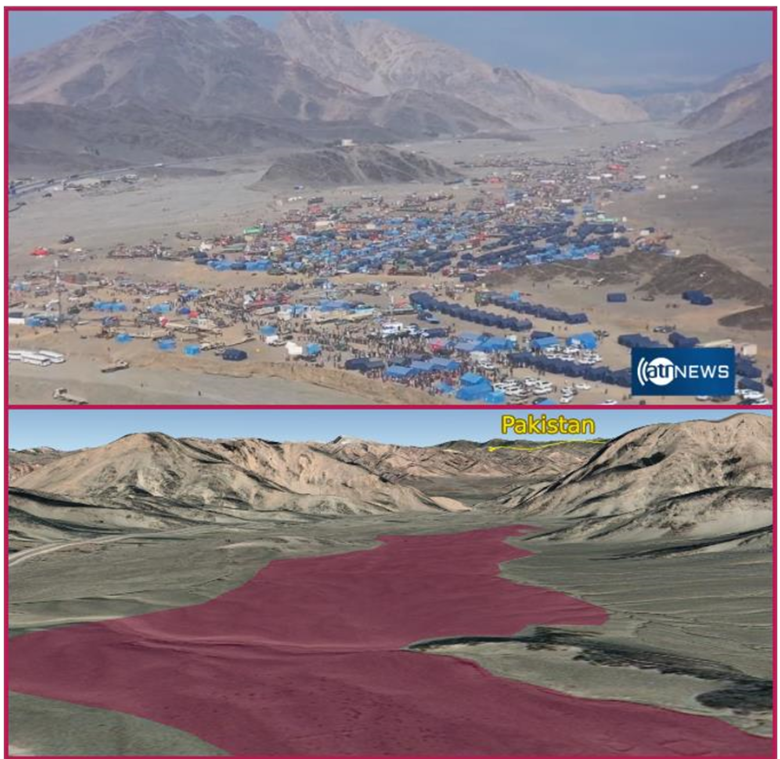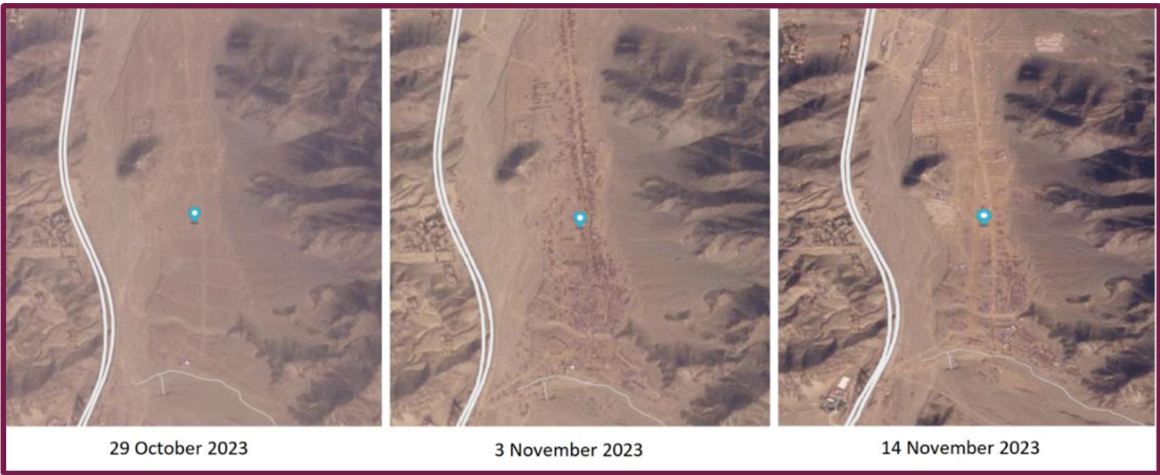Pakistan’s expulsion of refugees
On 3 October 2023, Pakistan’s interim Interior Minister Sarfraz Bugti announced that 1.7million Afghan people residing illegally in Pakistan would be forcibly deported within 28 days, and their property and businesses seized as of 1 November.
Just a week later, Minister Bugti told Independent Urdu that because “Afghanistan is now a peaceful country”, even legal refugees would be expelled. Bugti did not set a date for the latter, but the process is likely to take up to a year. UNOCHA Afghanistan reported that as of 14 November 2023, some 327,400 undocumented Afghans had already returned from Pakistan.
Taliban reaction to Pakistan’s announcement
Taliban Supreme Leader Mawlawi Hebatullah Akhundzada sought to appear responsive to the crisis, releasing an audio message on 3 November 2023, expressing distress over the treatment of Afghan refugees in Pakistan facing abroad, and announcing comprehensive support for returning refugees.
Other Taliban officials, including Defence Minister Mullah Muhammad Yaqoob, Acting Prime Minister Mullah Muhammad Hassan Akhund, Interior Minister Sirajuddin Haqqani, and Foreign Minister Amir Khan Muttaqi also issued statements condemning Pakistan over the deportations. The general sentiment was that Pakistan’s decision oppresses Afghan refugees and exploits them for political gain, stressing that the expulsion contradicts Islamic principles and human rights and calling on the islamic and global community to intervene on this as a result.
Interior minister Sirajuddin Haqqani and Foreign Minister Amir Khan Muttaqi both asserted that Pakistan’s decision to expel refugees was a means of exerting pressure on the Taliban to address ongoing Tehrik-e Taliban Pakistan (TTP) militancy in Pakistan, but that the TTP was Pakistan’s internal issue, and that their tactics would not force Taliban compliance.
Meanwhile, Afghan refugees expelled from Pakistan have expressed anger and hostility, calling for retaliation against Pakistan, with many viewing retribution as a religious and national duty.
Comprehensive support for returning refugees announced
Days after the Pakistan government’s announcement, the Taliban announced support for refugees, seeking to appear responsive to the needs of the returnees.
The Returnees Affairs Commission was established on 8 October, led by second deputy Prime Minister Abdul Salam Hanafi, to address the large number of refugees returning from Pakistan. The commission held a high-level meeting on 28 October, which designed a roadmap to facilitate the refugees returning from Pakistan, focusing on establishing temporary border camps at the border, providing basic facilities, fundraising, and facilitating refugees return to their native areas, with accomodation.
Shortly afterwards, the Ministry of Housing and Urban Development announced a committee on October 31 to provide land and permanent houses to returning refugees, many of whom had families that left Afghanistan decades ago. The Ministry of Defense announced the supply of 2,000 military trucks for transporting refugees’ belongings from the border to their designated destinations, and passenger buses to carry the returning refugees. Meanwhile, the Ministry of Higher Education pledged to enrol returning students in Afghan universities and colleges, ensuring their continued education.
The Taliban and its supporters extensively promoted these initiatives and promised comprehensive assistance to refugees.
Construction and growth of Torkham ‘refugee base’
On 17 November 2023, the Pashto channel of the state-owned National Radio Television Afghanistan (RTA) claimed that construction of a “refugee base” near the Torkham border crossing had begun. Drone footage, recorded by Ariana News on 10 November, showed a wide area near the Pakistan border covered with tents, vehicles and people. AW geolocated the video and determined that the camp was over 1.6 kilometres long and approx. 200m wide.

Figure: Geolocation of the drone footage showing the refugee camp near the Torkham border crossing [34.164945, 71.076009]. Source: Planet
AW also obtained satellite imagery from Planet to monitor the evolution of the refugee camp. The area appeared to be empty on 29 October 2023, but by 3 November, numerous tents and vehicles could be seen. Some reorganisation of tents was apparent by 14 November, with clear paths between groups of tents, and larger white tents concentrated in the top right and lower left area.

Figure: Satellite pictures showing the area near the Torkham border on 29 October (left), 3 November (middle), and 14 November (right) display an increase in the number of tents there over this period [34.164945, 71.076009]. Source: Planet
AW also observed videos and photos of the Torkham camp posted online, as well as those of temporary shelters and camps in Kabul, Ghazni, Kandahar, Paktika, Sar-e-pul, Kunar, Zabul, and Uruzgan. Some of this footage features blue tents, which appear to be medical facilities run by the Public Health Department and the Health Command of the Ministry of National Defence. The red logo visible on many of the tents indicates they were provided by the Chinese Government, while other tents appear to have been provided by the Afghan Red Crescent, Turkish Red Crescent, and the Emirates Red Crescent.
Despite declared humanitarian effort, reports of poor conditions have emerged
Although small water tanks with Save the Children and Qamar Foundation logos are visible in the footage posted of the camps online, returning Afghans have noted that camps lack toilets, food, proper shelter and sufficient water supplies. Moreover, the Qamar Foundation, an Afghan NGO, noted the lack of clean water in Torkham, and announced it would begin building a well to remedy the issue.
Food distribution also appears to be scarce and provided in an ad-hoc manner. Though the Ministry of Refugees shared pictures of Taliban members providing food and cash to returnees, these posts mention groups of 25-30 recipients and provide no indication of large-scale organised efforts to provide these essentials to the hundreds of thousands of Afghans returning to the country.
Videos posted on the local Torkham group on Facebook also show individuals distributing and selling food and bottled water, while other posts in the group mentioned the lack of available food. Aside from these, AW observed that most videos released by media outlets, the Taliban, or vloggers do not indicate an organised food distribution mechanism within the camps.
Enhanced risks for women and former government employees
In addition to the poor conditions reported in the camps, there have been claims of some returning refugees facing arrest and close scrutiny.
Sources interviewed by Afghanistan International claimed that Taliban investigation centres had been set up near the Torkham passport office, and said that anyone identified as having worked with the republican government or its military was arrested and taken to an unknown location. They added that the Taliban was also closely examining the documentation of women returning from Pakistan, scrutinising their work history.
AW local sources corroborated that the Taliban had established additional units at the border to collect biometric information of returnees, and added that many journalists, former judges, and members of civil society fear being identified upon return.


